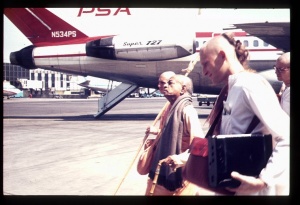SB 10.63.24

A.C. Bhaktivedanta Swami Prabhupada
TEXT 24
māheśvaraḥ samākrandan
vaiṣṇavena balārditaḥ
alabdhvābhayam anyatra
bhīto māheśvaro jvaraḥ
śaraṇārthī hṛṣīkeśaṁ
tuṣṭāva prayatāñjaliḥ
SYNONYMS
māheśvaraḥ—(the fever weapon) of Lord Śiva; samākrandan—crying out; vaiṣṇavena—of the Vaiṣṇava-jvara; bala—by the strength; arditaḥ—tormented; alabdhvā—not obtaining; abhayam—fearlessness; anyatra—elsewhere; bhītaḥ—frightened; māheśvaraḥ jvaraḥ—the Māheśvara-jvara; śaraṇa—for shelter; arthī—hankering; hṛṣīkeśam—Lord Kṛṣṇa, the master of everyone's senses; tuṣṭāva—he praised; prayata-añjaliḥ—with palms joined in supplication.
TRANSLATION
The Śiva-jvara, overwhelmed by the strength of the Viṣṇu-jvara, cried out in pain. But finding no refuge, the frightened Śiva-jvara approached Lord Kṛṣṇa, the master of the senses, hoping to attain His shelter. Thus with joined palms he began to praise the Lord.
PURPORT
As pointed out by Śrīla Viśvanātha Cakravartī, it is significant that the Śiva-jvara had to leave the side of his master, Lord Śiva, and directly take shelter of the Supreme Personality of Godhead, Lord Kṛṣṇa.